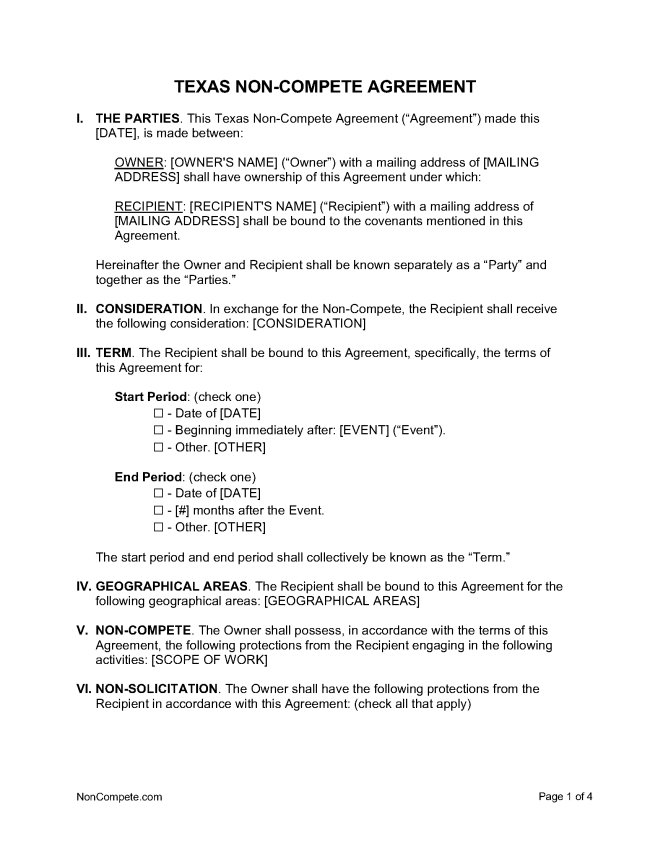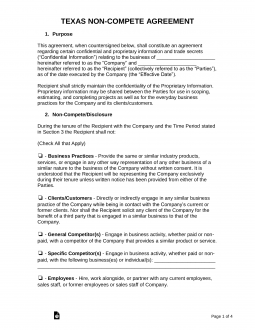Non-Compete Laws in Texas: An Overview
Non-compete laws in Texas play a crucial role in protecting businesses from unfair competition. These laws allow employers to restrict employees from working for competitors after leaving their job. Understanding these laws is essential for both employers and employees. This overview will help you grasp the key aspects of non-compete agreements, including their enforceability, main elements, and common challenges.
Key Elements of Non-Compete Agreements

Non-compete agreements contain several essential elements that determine their validity. Here are the key components:
- Parties Involved: The agreement must clearly identify the employer and employee.
- Reasonable Duration: The time period for which the non-compete is enforced should be reasonable, typically ranging from six months to two years.
- Geographic Scope: The area in which the employee is restricted from working must be clearly defined and should not be overly broad.
- Legitimate Business Interest: The employer must demonstrate a valid business interest that requires protection, such as trade secrets or customer relationships.
These elements ensure that non-compete agreements are fair and not overly restrictive. If any of these elements are missing or excessive, the agreement may be deemed unenforceable.
Enforceability of Non-Compete Clauses
The enforceability of non-compete clauses in Texas depends on several factors. Courts often examine these agreements closely to ensure they do not unfairly restrict an individual’s right to work. Here are some key considerations:
- Reasonableness: Courts evaluate whether the duration and geographic scope are reasonable and necessary to protect the employer’s legitimate interests.
- Public Policy: Non-compete agreements cannot violate public policy. If they unfairly restrict competition or harm the public interest, they may be struck down.
- Written Agreement: For non-compete agreements to be enforceable, they must be in writing and signed by both parties.
- Consideration: There must be adequate consideration, meaning that the employee must receive something of value in exchange for signing the agreement.
If a non-compete agreement meets these criteria, it is more likely to be enforced by Texas courts. However, employees should consult legal advice if they face enforcement challenges.
Exceptions to Non-Compete Laws
While non-compete agreements are generally enforceable in Texas, there are notable exceptions that both employers and employees should be aware of. Understanding these exceptions can help clarify when a non-compete might not hold up in court.
- Employee’s Right to Work: Courts may refuse to enforce a non-compete if it severely restricts an individual’s ability to earn a living, especially in cases where the employee’s role does not involve trade secrets or proprietary information.
- Involuntary Termination: If an employee is laid off or terminated without cause, some courts may deem the non-compete unenforceable, arguing that it’s unfair to restrict their future employment opportunities.
- Independent Contractors: Non-compete agreements with independent contractors can be more challenging to enforce. Courts may view these agreements differently compared to those involving traditional employees.
- Public Interest: If enforcing a non-compete would harm the public interest, such as in industries vital to public welfare (like healthcare), courts may refuse enforcement.
Being aware of these exceptions can help employees understand their rights and can guide employers in drafting fair and enforceable agreements.
Recent Changes in Texas Non-Compete Laws
Non-compete laws in Texas have evolved over the years, reflecting changes in business practices and workforce dynamics. Recently, several significant changes have occurred:
- Legislation Updates: Recent bills have clarified what constitutes a reasonable non-compete clause, emphasizing the need for a balance between protecting business interests and not unduly restricting employees.
- Stronger Protections for Employees: Lawmakers have introduced measures that provide greater protections for employees, ensuring that non-compete agreements are not excessively burdensome.
- Focus on Trade Secrets: Changes in the law emphasize that non-compete agreements should primarily protect legitimate business interests like trade secrets rather than just limiting competition.
- Increased Scrutiny: Courts are applying more stringent scrutiny to non-compete agreements, making it crucial for employers to ensure that their agreements comply with current legal standards.
Staying informed about these changes can help both employers and employees navigate the complexities of non-compete laws in Texas.
Common Challenges to Non-Compete Agreements
Non-compete agreements can face several challenges in court, and it’s important to know what these are. Both employers and employees may find themselves involved in disputes over these agreements. Here are some common challenges:
- Ambiguity: If a non-compete agreement is vague or unclear, it can be challenged in court. Agreements must clearly outline the restrictions and scope to be enforceable.
- Overreach: Courts often strike down non-compete clauses that are overly broad in geographic scope or duration. An agreement that restricts employment in too wide an area or for too long may not be enforced.
- Lack of Consideration: If the employer did not provide adequate consideration, such as a promotion or bonus, the non-compete may be deemed unenforceable.
- Employee’s Position: Non-compete agreements can be challenged based on the employee’s role. If the job doesn’t involve sensitive information or trade secrets, the agreement might not be justified.
Both parties should approach non-compete agreements with caution and seek legal guidance to minimize the risk of challenges and ensure compliance with Texas laws.
How to Draft a Valid Non-Compete Agreement
Creating a valid non-compete agreement requires careful consideration to ensure it is enforceable and protects your business interests. Here are some steps to guide you in drafting an effective agreement:
- Define the Purpose: Clearly outline the business interests that need protection, such as trade secrets, client relationships, or proprietary information.
- Specify the Duration: Choose a reasonable time frame for the non-compete. Typically, this can range from six months to two years, depending on the industry and position.
- Limit Geographic Scope: Clearly define the geographic area where the restrictions apply. Make sure it’s specific and not overly broad. For example, if you operate locally, limit it to that area.
- Incorporate Adequate Consideration: Ensure that the agreement includes something of value for the employee, such as a signing bonus, promotion, or access to sensitive information.
- Consult Legal Experts: Before finalizing the agreement, have a lawyer review it to ensure compliance with Texas law and that it meets all necessary criteria.
By following these steps, you can draft a non-compete agreement that is both fair and legally enforceable, helping to protect your business interests while respecting your employees’ rights.
FAQ about Non-Compete Laws in Texas
Here are some frequently asked questions regarding non-compete laws in Texas, providing clarity on common concerns:
- Are non-compete agreements enforceable in Texas? Yes, non-compete agreements are enforceable if they meet certain criteria, such as reasonableness in duration and geographic scope.
- What is considered reasonable duration for a non-compete? Generally, a duration of six months to two years is considered reasonable, but it varies based on the industry.
- Can an employer enforce a non-compete if they terminate the employee? If an employee is terminated without cause, the enforceability of the non-compete may be challenged.
- What happens if a non-compete agreement is found unenforceable? If a court finds the agreement unenforceable, the employee may work for competitors without restriction.
- Do non-compete agreements apply to independent contractors? Yes, but they are often harder to enforce. The specific terms and context matter greatly.
These FAQs help shed light on some of the most pressing questions regarding non-compete agreements in Texas, making it easier for both employers and employees to understand their rights and obligations.
Conclusion on Non-Compete Laws in Texas
Non-compete laws in Texas are vital for balancing the interests of businesses and employees. While these agreements can protect legitimate business interests, they also must respect individual rights to work. It’s essential for employers to draft clear, reasonable agreements and for employees to understand their rights under these laws. As the legal landscape continues to evolve, staying informed about changes and exceptions to non-compete laws will benefit everyone involved.
In summary, whether you are an employer looking to safeguard your business or an employee trying to navigate your rights, understanding non-compete laws in Texas is crucial. Consulting legal experts can also provide additional clarity and ensure compliance, paving the way for fair and enforceable agreements.


